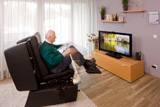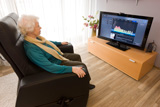Easy chair and fitness coach in one
Demographic trends have been telling the story for years. An increasingly aging society is becoming more and more self-reliant. With this in mind, researchers are working on technologies to help us manage our daily lives in later years. Fraunhofer IIS, based in Erlangen, Germany, will be introducing one such technology at the 2013 CeBIT trade fair in Hannover from March 5 to 9 (hall 9, booth E08): an intelligent easy chair designed not only for lounging comfortably in front of the television, but also for motivating us to stay healthy and in shape. The following partners have been working on this project: ISA Informationssysteme GmbH, himolla Polstermöbel GmbH, Sophia mit P.S. GmbH, Technische Universität München, Chair of Preventive Pediatrics and Chair of Building Realisation and Robotics, Innovationsmanufaktur GmbH and EnOcean GmbH.
Rowing regatta at the push of a button: the GEWOS easy chair lets seniors stay in shape in the comfort of their own home. From the outside, GEWOS looks like any commercially-available easy chair. Even while sitting, there is no discernible difference. You can't judge a chair by its cover however. A glance at the inner workings reveals sensors, circuit boards and scores of wires. The microsystem technology built into the seat cushion, back and arm rests constantly monitors the health of the chair's occupant. "GEWOS tracks and records the vital body functions and the correct sitting position. If the values deviate from pre-defined settings, the system suggests stamina exercises or a healthier sitting position," explains Sven Feilner from the Image Processing and Medical Technology department at Fraunhofer IIS.
Television in a completely new light
Using Bluetooth or WLAN, the sensor data is transmitted to the television via a tablet PC. "At a glance users can track their pulse, oxygen saturation, blood pressure or body weight over a specific time span. A virtual health assistant uses the data to create a custom exercise plan, which is then optimized depending on the training progress being made," says Feilner in describing how the system works. If the values do not improve within a pre-defined range, the health coach might recommend more exercise for instance. The chair is then transformed into a rowing machine similar to those found in fitness studios. The arm rests convert to oars and a foot rest folds out from the bottom of the chair. Individual exercise routines are easily displayed on the television. "Even in this mode, the sensors record all of the values and the health assistant then notes if the person is not performing the exercises properly," adds Feilner.
The chair was put through its paces last year, passing with flying colors. After 100 seniors tested 14 different assisted living products at the 2012 Ambient Assisted Living Congress, GEWOS came out on top. Looking ahead, Feilner adds: "The next step will be a long-term evaluation that will let us add the finishing touches. We are extremely confident that we can work with our partners to bring the chair to market in the foreseeable future." To expand the capabilities of the system even further, the GEWOS project team is looking to exploit the human competitive instinct. Apart from being able to row against virtual opponents, the idea is to encourage seniors to join in the action by playing games of concentration. This might include requiring the user to make note of chair elements and then put them under a stress load with the corresponding part of the body. CeBIT attendees can get a good feel for how the chair works by visiting the Fraunhofer IIS booth.
Seven partners, one goal
The GEWOS project, which is being funded by the German Federal Ministry of Education and Research, involves Fraunhofer IIS and six partners from industry and research. The objective is to develop an assistance system that is easy to use and readily accepted by older generations. In addition to the exercise chair, GEWOS features a web platform that acts as a central information management interface for calling up health data and incorporating physicians and health specialists. "Seniors should be able to move around independently within their own homes for as long as possible. That requires staying healthy. The exercise chair offers a simple, motivational tool for keeping in shape," concludes Feilner.

